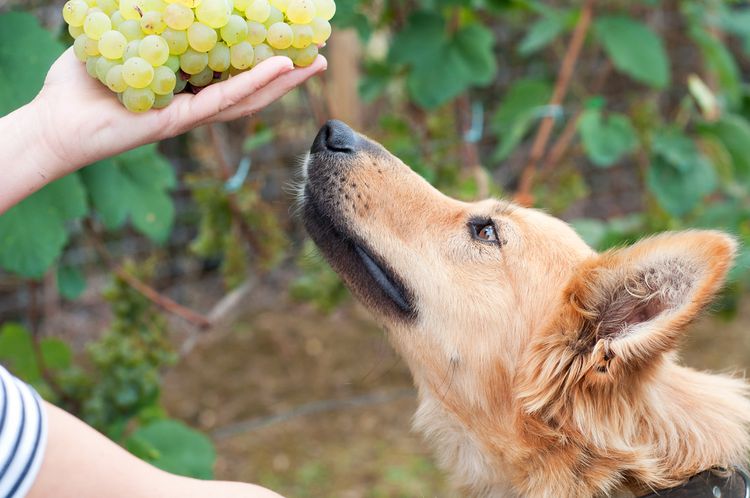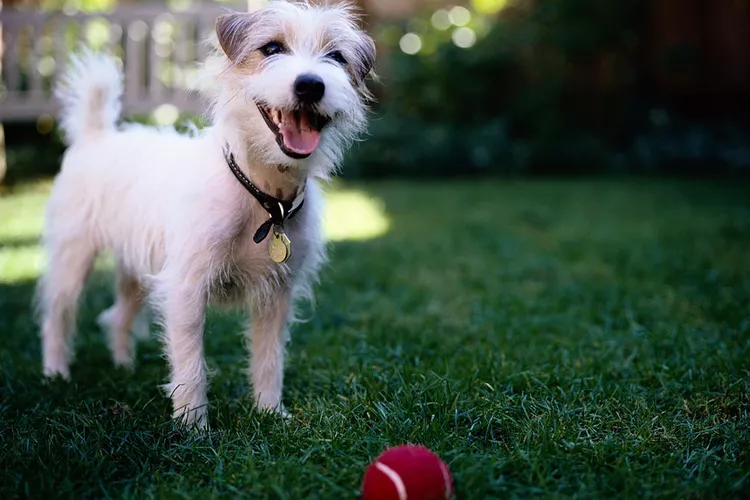
Do you sometimes sprinkle grated Parmesan cheese on your dog's food to entice them to eat? Maybe you've stopped and wondered if your dog should be eating Parmesan.
Parmesan is a hard, aged cheese originating from the Reggio Emilia, Parma region of Italy. It is a hard cheese, meaning it is low in lactose, as opposed to softer cheeses such as mozzarella and brie. It is also an aged cheese (sometimes aged up to 12 months), meaning it is higher in sodium than non-aged cheeses. It's important to note that 'true' Parmesan cheese is more commonly called Parmigiano-Reggiano in the United States. While the Parmesan you can purchase pre-grated in plastic shakers is technically Parmesan cheese, these contain preservatives not used in classic Parmesan.
Most dogs are actually lactose intolerant to a point. Dogs lack the enzyme lactase needed to break down the milk sugar lactose. A healthy dog may be able to tolerate up to 2 g of lactose per kg of body weight. There's 2.2 lbs in 1 kg, so if you know your dog's weight in pounds, simply divide by 2.2 to determine their weight in kilograms. Grated Parmesan may contain anywhere from 2.9% to 3.7% lactose, while fresh Parmigiano-Reggiano may contain anywhere from 0 to 3.2% lactose. Since Parmesan is a hard cheese with less lactose in it than some other, softer cheeses, it may be easier for your pup to digest.
The aging process means it will naturally be higher in sodium than other cheese varieties. When Parmesan was first created, salt was the most commonly used natural preservative, so it remains a high source of salt. This can be a health concern for healthy dogs but especially for dogs with certain diseases, including heart and kidney disease. If your dog has a heart or kidney condition, you should avoid feeding them Parmesan, as salt toxicity is something that can happen in dogs. For most healthy, adult dogs, a toxic dose of salt is ~4000 mg of salt per kg of body weight. Dogs with heart disease or kidney disease will be even more sensitive to salt. Parmesan cheese has about 76 mg of salt per tablespoon of cheese. A healthy dog will need to ingest a large amount of cheese for it to be considered deadly, but that doesn't mean non-lethal doses are healthy. A dog should consume no more than 1 mg of salt per kg of body weight per day. Keep in mind, though, that your dog is consuming salt in their diet and other treats, not just Parmesan.
Due to its low lactose level, Parmesan can be easier on your dog's GI system than other cheeses. In large amounts, though, your dog can still experience gastrointestinal upset. If your dog is intolerant of the lactose in Parmesan you may see any of the following:
Since Parmesan is higher in salt content than it is in lactose, signs of salt toxicity will be more commonly seen than signs of lactose intolerance. A dog that has consumed too much salty Parmesan will exhibit the following symptoms:
True cases of salt toxicity, if not treated immediately, can lead to coma and death, so if your dog eats Parmesan and you then notice any of the above symptoms, seek veterinary attention immediately.
If your dog eats Parmesan, first try to determine how much Parmesan they ate. Depending if you have a shaker bottle of grated Parmesan or a block of it, this may be more or less difficult to figure out accurately. If they ate a large amount of cheese (relative to how big your dog is—a 5 lb dog eating a whole shaker bottle of Parmesan will be affected differently than a 55 lb dog eating that same shaker bottle of Parmesan), you can call your vet or Pet Poison Control to determine if you should seek medical attention now or if you should ride it out and monitor for symptoms. In the United States you can call (888) 426-4435 to contact the ASPCA Pet Poison Hotline or (855) 764-7661 to contact the Pet Poison Helpline.
If the hotline does recommend a vet visit, they will give you a case number to then give your veterinarian. This is helpful for your veterinarian as they can call the hotline and get
specific recommendations from the veterinary toxicologist for your dog. While most veterinarians know what is poisonous for your dog to consume and what isn't, there are so many toxins your dog can get into, there is a different treatment for each, and the treatment plans can change based on a dog's medical history and how they are responding to therapy. The veterinarians that work at pet poison control centers are essentially veterinary specialists when it comes to toxin ingestion.
While most dogs can eat small amounts of cheese and not have any lasting side effects, not all cheeses are created the same. Parmesan cheese, with it's high salt content, isn't the best dog treat or food topper. Instead, opt for something like cottage cheese. This is a much healthier product for your dog to be snacking on.

212 Hairless Cat Names For Your Beautifully Bald Feline
Discover the perfect name for your hairless cat with our list of over 200 creative and unique names. From quirky to classic, find a fitting choice for your beautifully bald feline companion.
8 Things Your Cat Loves
Just like humans, cats can have a long list of things they like. Find out what cats love so you can keep your cat happy and healthy.
How to Tell If a Kitten is a Boy or a Girl
If you're wondering whether your new kitten is a boy or a girl, here are three ways to help determine the sex of your cat.
8 Tips to Help Cats Enjoy Car Travel
Cats are creatures of habit, and they hate to travel. Learn tips to prepare them for travel in the car, whether going to the vet or on vacation.
Common Causes of Mucus in Dog Poop
Seeing mucus in your dog's poop can be concerning to a dog owner. Here are common causes and treatment of mucus in a dog's stool.
Is Shrimp Bad For Dogs?
Shrimp can be a healthy, nutritional food for people but can dogs eat them, too? What are the main concerns with feeding shrimp to your dog?
Can Dogs Eat Grapes?
Are grapes safe for dogs? Grapes and raisins can cause serious toxicity in dogs. Find out what to do if your dog eats grapes.
Maine Coon Cat: Breed Profile, Characteristics & Care
The Maine Coon cat is of the largest cat breeds in the world. These amiable, gentle cats make great companions. Learn about the Maine Coon cat breed's appearance, temperament, health, and care needs.
Selkirk Rex: Cat Breed Profile, Characteristics & Care
The Selkirk Rex is a charming cat with a tousled coat and a loving, laid-back personality. Learn about the Selkirk Rex breed.
How to Stop Your Cat From Chewing Electrical Cords
Cats are known to pounce and attack inanimate objects, like electrical cords. Learn how to prevent your cat from ambushing objects that may harm it.
What Do Cats Think About?
Have you ever wondered what cats think about? A number of studies have explored cat behavior and feline cognition, but there's still more to learn.
Training Your Kitten to Use the Litter Box
Bringing home a new kitten means they need to learn how to properly use a litter box. Discover how to successfully litter box train your kitten.
Why Do Cats Knead?
Kneading is a common behavior in cats of all ages. Learn why cats "make biscuits" and what it means for you, your cat, and all your blankets.
Dandie Dinmont Terrier: Dog Breed Characteristics & Care
Learn about the Dandie Dinmont Terrier, a silky dog breed with a signature puff of hair atop its head and a friendly, companionable personality.
Tibetan Mastiff: Dog Breed Characteristics & Care
Learn about the Tibetan mastiff, an ancient guardian dog breed. This breed is known for their massive stature, flowing mane, and protective personality.
4 Reasons Why Your Dog Licks Their Butt
Butt-licking in dogs can be a part of normal grooming, but excessive butt-licking is not normal. Read about the most common reasons for this behavior.
How to Teach Your Dog the "Leave It" Command
Training your dog the "leave it" command is a great way to instill self-control. Learn how to teach your dog to not pick things up from the ground.
How to Solve Your Dog's Fear of Car Rides
Is your dog scared of car rides? This fear of riding in cars is common. Learn why your dog is scared of car rides and how to help conquer this fear.
Can Dogs Get Depression? How to Help Your Sad Dog
Can dogs get depression? Learn about the signs of depression in dogs and find out how to help your sad dog.
How to Play Tug of War With Your Dog
Many dogs love to play tug of war, and it's a healthy game that provides great exercise. Learn the best way to safely play tug of war with your dog.